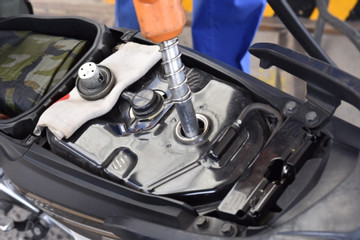- © Copyright of Vietnamnet Global.
- Tel: 024 3772 7988 Fax: (024) 37722734
- Email: evnn@vietnamnet.vn
vietnam's petrol market
Update news vietnam's petrol market
Enterprises repeatedly violate regulations, new management policy needed
Repeated violations by enterprises have revealed numerous shortcomings in petroleum business policies. Therefore, a new decree to plug "loopholes" and ensure market transparency in petroleum businesses is urgently needed.
Vietnam eases fuel business regulations, abolishes price control task force
Vietnam’s Ministry of Industry and Trade (MOIT) has issued Circular 18, eliminating outdated fuel regulations, including state-controlled price regulation mechanisms. New reporting rules for fuel storage businesses aim to enhance market transparency.
Ministry to allow petrol companies to determine prices, reform management
The Ministry of Industry and Trade (MOIT) is currently collecting public opinions on the draft decree on petroleum business management. Nonetheless, there are still arguments related to policy proposals.
Pricing expert calls for closing of loopholes in petroleum market
A number of petroleum distributors have been prosecuted recently, reflecting the serious problems that exist in the petroleum market. Closing legal loopholes will be necessary to ensure the smooth operation of the market.
Gasoline prices will not fluctuate much in 2025: expert
Global gasoline prices will not fluctuate much in 2025, according to Doan Quyet Tien, an expert from the Vietnam Petroleum Institute (VPI).
Abandon the view that ‘if something is unmanageable, it should be banned’
The draft decree on petroleum business needs to be rewritten to strictly comply with Party Chief To Lam’s instruction that the view that ‘if something is unmanageable, it should be banned’ need to be eliminated.
Draft decree on petroleum businesses sparks debate
Facing strong opposition from petroleum businesses, the Ministry of Finance (MOF), the compiler of the draft decree on petroleum business management, has persisted in its opinion.
Taking losses from petroleum sales, big distributor wants to reduce imports
Several major distributors have proposed reducing the petroleum import volume assigned to them in 2024.
Private petrol companies face hardship, while Petrolimex makes big profits
While many private oil and gas companies are struggling with losses and huge tax debts, and their leaders are banned from leaving the country, Petrolimex, the biggest player in the field, has reported impressive business results.
Ministry's new petroleum pricing scheme is still confusing
Experts say the new petroleum pricing scheme created by the Ministry of Industry and Trade (MOIT) is just like the old one and does not solve existing problems.
Amendments to petrol business regulations needs to be market-based
The Ministry of Industry and Trade’s draft proposal on the petrol business which states that distributors are not allowed to trade petrol with each other but only permitted by buy petrol from wholesalers, has met objections.
Market-based pricing to benefit petroleum consumers: experts
Experts believe that it is necessary to change the current petroleum market management scheme, and apply a market-based pricing policy instead of administrative instructions.
Deputy PM assigns MoIT to establish a petroleum exchange floor
Deputy Prime Minister Le Minh Khai asked the Ministry of Industry and Trade (MoIT) to study the establishment of a petroleum exchange.
Petrol distributors hesitate to sell Euro 5 fuel, car owners suffer
Many next-generation car owners complain that it is difficult to find filling stations that meet Euro 5 fuel standards. However, this kind of fuel accounts for only 10 percent of demand.
Gasoline market sees decline in distributors amid new regulations
Since the beginning of the year, 16 traders have requested the return of their certificates of eligibility to be gasoline distributors, leading the Ministry of Industry and Trade to revoke these licenses as per regulations.
Dozens of traders quit petroleum distribution, struggling to compete
Sixteen traders have quit the petroleum distribution business since the beginning of 2024, but their leaving will not impact petroleum supplies, a representative from the Ministry of Industry and Trade said.
Enterprises urge petrol price stabilisation fund to be abolished
As the domestic petrol prices are also going parallel with the world market, the removal of the petrol price stabilisation fund should be considered.
Foreign investors encouraged to invest in petroleum storage infrastructure
Under the plan, the focus will also be on developing the petrol stations along new roads and in new urban areas with an appropriate roadmap to reduce the number of small-scale and inefficient stations.
Electronic invoices improve transparency of petroleum market
Technology experts say that using e-invoices is necessary to achieve a transparent petroleum distribution market to prevent unofficial products and false statements about petroleum output.
State authorities will not participate in petroleum price management process
The second draft was revealed on April 1, a few days after the ministry submitted the first draft of the revised Decree on petroleum business.



















